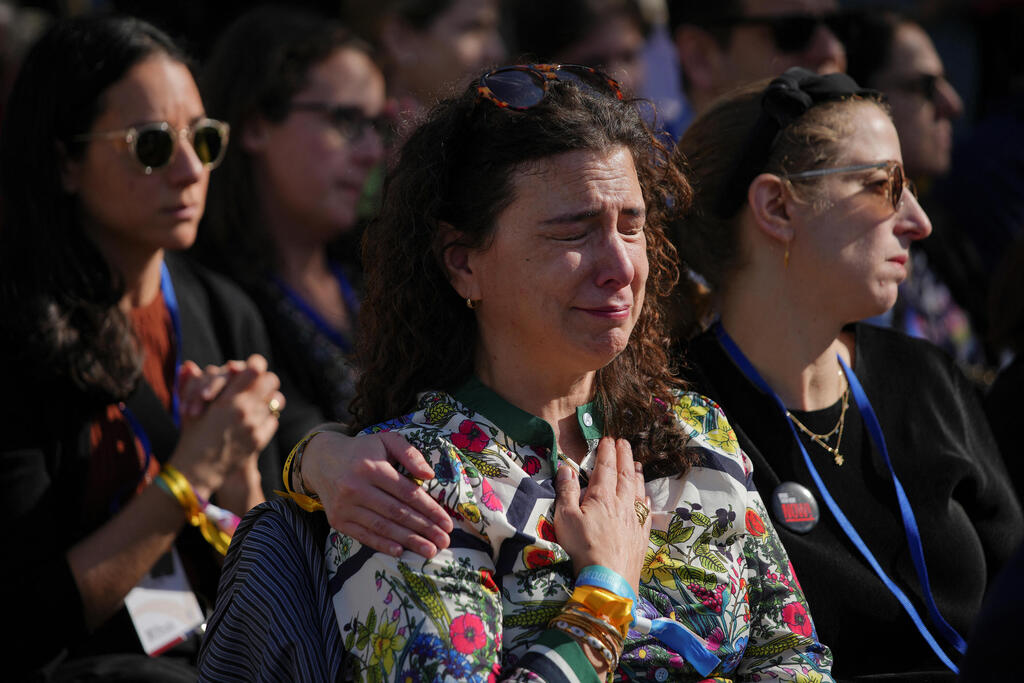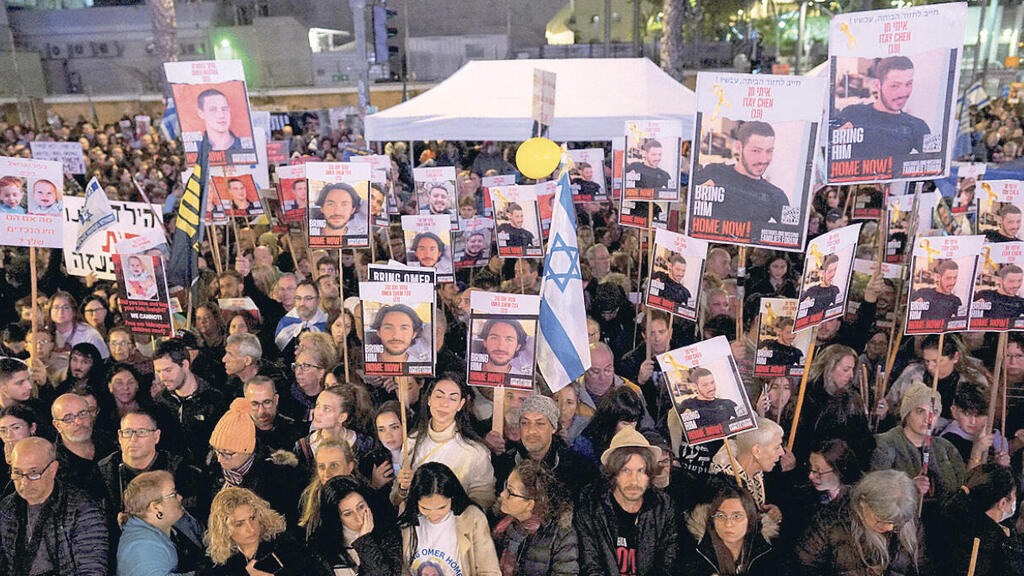Getting your Trinity Audio player ready...
There's no sugarcoating this - Agreeing to Hamas' demands in order to free the hostages, is tantamount to capitulation. Right now, the camp within the government ready to accept a hostage deal is led by Gadi Eizenkot, who believes in taking any measure and putting any Hamas demand on the table in the name of a second hostage deal, even if that means releasing any and all terrorist prisoners from Israeli jails. He is joined by Benny Gantz and Aryeh Deri.
Read more:
My colleague, Ronen Bergman, has written a well-detailed article about the folly of continued fighting which he says endangers the hostages rather than bringing about their release. He has a point, to the extent that the lack of a post-war strategy will add to losses in the war, but I stop short of saying the solution is accepting Hamas' demands.
History teaches us that this could lead to a perilous situation, where all Israeli achievements since the start of the war are rendered meaningless. Hamas leaders would announce victory and resume their control over Gaza, boasting some notable strategic achievements. Moderate Arab states would view Israel as weak, where prevailing public winds come before sound judgment.
Iran's Axis of Resistance would similarly see Israel as vulnerable and the next attack, either from the strip or the northern border, would only be a a question of time. Northern residents would refuse to return home, and the "Everyone-for-everyone" deal would embolden thousands to take the fight to Israel.
When empathy becomes detrimental
Hostage families have been resolute and unequivocal in their demand of Netanyahu - Take any step necessary to release all hostages without delay, even if it means Hamas remains standing and the Gaza Strip remains absolutely drenched in weaponry that will be turned against Israel later.
In stark contrast, residents of the communities near the Gaza border wish to see Hamas dismantled. No more rockets, artillery or raids. How can the threat be removed if that involves Hamas not only alive and well, but bolstered by thousands joining its ranks to defeat Israel?
Israel cannot relinquish neither releasing the hostages nor dismantling Hamas, but achieving both requires patience. The "here and now" approach would compromise our security. The pressure exerted by hostage families would raise the price Hamas demands, making a second hostage deal less possible. Empathy toward hostage families is fine, but it is not when it brings calls for capitulation among government ministers. There is no situation where we can both accept Hamas' demands and bring all residents back to their homes on either border.
3 View gallery


Doctor Sharon Ravitch, from the University of Pennsylvania, reacts at the plaza in support of the families of hostages kidnapped on October 7
(Photo: Alexandre Meneghini / Reuters )
There are plenty of things to criticize when it comes to the way the war is currently managed. We have no strategy nor clearly defined objectives, but that doesn't mean hostages have been forgotten, and we can always flood tunnels with either seawater or gasoline, which can be lit up to kill Yahya Sinwar and Mohammed Deif. However, since the hostages could be nearby, that's not an option yet. This isn't easy, but surrendering is not a solution.
Writing this down is not easy. A deal means hostages get to go home and the entire nation feels a sense of relief, but this isn't our first rodeo. Every time we went for the "no matter the price" approach, we paid dearly. Ehud Olmert, Ehud Barak and Tzipi Livni all support releasing the hostages in their day, regardless of the price.
A pyrrhic victory
This is why it bears mentioning that back in 2009, then-Defense Minister Ehud Barak said: "Hamas need not be supplied with weaponry. When it comes to hostage deals, it's a slippery slope that must be stopped."
Olmert, Prime Minister at the time, said: "As long as I head this government, we will not take our marching order from Hamas."
Just two years later, the Netanyahu government agreed to release over 1,000 prisoners to retrieve IDF soldier Gilad Shalit who was held captive for five years, and then-opposition chair, Tzipi Livni, said: "Israel has been weakened and red lines have been crossed. This will backfire."
And then what happened? One of the prisoners we released, Marwan Kawasmeh, was directly involved in the kidnapping and killing of Eyal Yifrach, Gilad Shaer, and Naftali Fraenkel, an event that triggered the war in 2014. Care to venture a guess as to who else was released in that deal? Yahya Sinwar, the man chiefly responsible for October 7. Another deal means we've learned nothing.
Sure, there are notable differences. Shalit was one soldier and now there are well over 100 civilians. The country cannot leave them behind, but a premature deal, pushed by the families' zeal, could render the enormous sacrifice our troops have made, nothing more than a Pyrrhic victory.
Taking control of the narrative
Both Gantz and Eizenkot joined the war cabinet just days after October 7, with questionable contribution. They could have pushed for a ceasefire in exchange for Hamas laying down their arms. True, Hamas would likely have laughed at the idea, but so what? At least that would have signified an Israeli response to the pressure from the international community.
An Israeli initiative to call for a cease-fire, no but one that is a capitulation to the demands of Hamas, yes? Is this their political wisdom? How can we get out of this conundrum?
It's true Israel cannot sustain a war that might go on for years, as the financial toll would be disastrous, but the solution isn't surrender. The solution is to flip the script. A ceasefire is fine, as long as it's conditioned on Hamas laying down their arms and releasing the hostages in exchange for Israel laying down the dough required to reconstruct the enclave.
 Ben-Dror YeminiYnet
Ben-Dror YeminiYnetHamas's refusal means the siege on Gaza continues, an initiative that should include the United Arab Emirates and Saudi Arabia, which could be persuaded to agree to such a move.
Yes, the families are hurting. Every day they're away from their loved ones is hell. Maybe they're tortured or raped, but what else must happen to make us understand that capitulation would be the death of us? We've been there and done that. Let's try something else.





